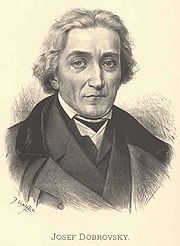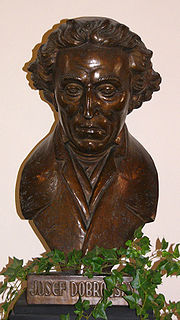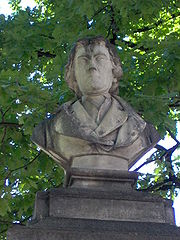
Josef Dobrovský
Encyclopedia



Bohemia
Bohemia is a historical region in central Europe, occupying the western two-thirds of the traditional Czech Lands. It is located in the contemporary Czech Republic with its capital in Prague...
n philologist and historian
Historian
A historian is a person who studies and writes about the past and is regarded as an authority on it. Historians are concerned with the continuous, methodical narrative and research of past events as relating to the human race; as well as the study of all history in time. If the individual is...
, one of the most important figures of the Czech national revival
Czech National Revival
Czech National Revival was a cultural movement, which took part in the Czech lands during the 18th and 19th century. The purpose of this movement was to revive Czech language, culture and national identity...
.
Life & Work
He was born at BalassagyarmatBalassagyarmat
Balassagyarmat is a town in northern Hungary. It was the seat of the Nógrád comitatus.- History :The town's coat-of-arms bears the Latin inscription "Civitas Fortissima" , because in January 1919 Czechoslovak troops crossed the demarcation line delineated in December 1918 in preparation for the...
, in Hungary
Hungary
Hungary , officially the Republic of Hungary , is a landlocked country in Central Europe. It is situated in the Carpathian Basin and is bordered by Slovakia to the north, Ukraine and Romania to the east, Serbia and Croatia to the south, Slovenia to the southwest and Austria to the west. The...
, when his father Jakub Doubravský was temporarily stationed as a soldier
Soldier
A soldier is a member of the land component of national armed forces; whereas a soldier hired for service in a foreign army would be termed a mercenary...
there. He received his first education in the German
German language
German is a West Germanic language, related to and classified alongside English and Dutch. With an estimated 90 – 98 million native speakers, German is one of the world's major languages and is the most widely-spoken first language in the European Union....
school at Horšovský Týn
Horšovský Týn
Horšovský Týn is a town in the Plzeň Region of the Czech Republic. It lies on the River Radbuza, some south-west of the region capital Plzeň.- History :...
in Plzeň district, made his first acquaintance with Czech language
Czech language
Czech is a West Slavic language with about 12 million native speakers; it is the majority language in the Czech Republic and spoken by Czechs worldwide. The language was known as Bohemian in English until the late 19th century...
and soon made himself fluent in it at the Německý Brod
Havlíckuv Brod
Havlíčkův Brod , Německý Brod until 1945 is a town in the Vysočina Region of the Czech Republic. It is also the capital of the Havlíčkův Brod district. It is located on the Sázava River in the Bohemian-Moravian Highlands and has a population of 24,321 as of 2003...
gymnasium and then studied for some time under the Jesuits at Klatovy
Klatovy
Klatovy is a town in the Plzeň Region of the Czech Republic.Klatovy is also the seat of the Municipality with Extended Competence and Municipality with Commissioned Local Authority.- History :Klatovy was founded during 1260–1263 by Přemysl Otakar II....
. In 1769 he began to study philosophy
Philosophy
Philosophy is the study of general and fundamental problems, such as those connected with existence, knowledge, values, reason, mind, and language. Philosophy is distinguished from other ways of addressing such problems by its critical, generally systematic approach and its reliance on rational...
at the University of Prague
Charles University in Prague
Charles University in Prague is the oldest and largest university in the Czech Republic. Founded in 1348, it was the first university in Central Europe and is also considered the earliest German university...
. In 1772 he was admitted among the Jesuits at Brno
Brno
Brno by population and area is the second largest city in the Czech Republic, the largest Moravian city, and the historical capital city of the Margraviate of Moravia. Brno is the administrative centre of the South Moravian Region where it forms a separate district Brno-City District...
and was preparing for a Christian mission in India
India
India , officially the Republic of India , is a country in South Asia. It is the seventh-largest country by geographical area, the second-most populous country with over 1.2 billion people, and the most populous democracy in the world...
. However, the entire order was dissoluted in the Czech lands in 1773 and Dobrovský thus returned to Prague to study theology
Theology
Theology is the systematic and rational study of religion and its influences and of the nature of religious truths, or the learned profession acquired by completing specialized training in religious studies, usually at a university or school of divinity or seminary.-Definition:Augustine of Hippo...
.
After holding for some time the office of tutor for the Count Nostitz
Nostitz (family)
The Nostitz family are a Silesian aristocratic family, named after Nostitz in Saxony, with a history dating back to 1280.Famous members of the family have included:* Helene von Nostitz, , writer and salon Dame...
, he obtained an appointment first as vice-rector, and then as rector, in the general seminary at Hradisko (now part of Olomouc
Olomouc
Olomouc is a city in Moravia, in the east of the Czech Republic. The city is located on the Morava river and is the ecclesiastical metropolis and historical capital city of Moravia. Nowadays, it is an administrative centre of the Olomouc Region and sixth largest city in the Czech Republic...
); but in 1790 he lost his post through the abolition of the seminaries throughout the Habsburg Empire, and returned as a guest to the house of the count. At this time, he wrote some of the most important works in Slavic studies, historiography
Historiography
Historiography refers either to the study of the history and methodology of history as a discipline, or to a body of historical work on a specialized topic...
and philology
Philology
Philology is the study of language in written historical sources; it is a combination of literary studies, history and linguistics.Classical philology is the philology of Greek and Classical Latin...
.
In 1792 he was commissioned by the Bohemian Academy of Sciences to visit Stockholm
Stockholm
Stockholm is the capital and the largest city of Sweden and constitutes the most populated urban area in Scandinavia. Stockholm is the most populous city in Sweden, with a population of 851,155 in the municipality , 1.37 million in the urban area , and around 2.1 million in the metropolitan area...
, Turku
Turku
Turku is a city situated on the southwest coast of Finland at the mouth of the Aura River. It is located in the region of Finland Proper. It is believed that Turku came into existence during the end of the 13th century which makes it the oldest city in Finland...
, St Petersburg and Moscow
Moscow
Moscow is the capital, the most populous city, and the most populous federal subject of Russia. The city is a major political, economic, cultural, scientific, religious, financial, educational, and transportation centre of Russia and the continent...
in search of the manuscripts which had been scattered by the Thirty Years' War
Thirty Years' War
The Thirty Years' War was fought primarily in what is now Germany, and at various points involved most countries in Europe. It was one of the most destructive conflicts in European history....
; and on his return he accompanied Count Nostitz
Nostitz (family)
The Nostitz family are a Silesian aristocratic family, named after Nostitz in Saxony, with a history dating back to 1280.Famous members of the family have included:* Helene von Nostitz, , writer and salon Dame...
to Switzerland
Switzerland
Switzerland name of one of the Swiss cantons. ; ; ; or ), in its full name the Swiss Confederation , is a federal republic consisting of 26 cantons, with Bern as the seat of the federal authorities. The country is situated in Western Europe,Or Central Europe depending on the definition....
and Italy
Italy
Italy , officially the Italian Republic languages]] under the European Charter for Regional or Minority Languages. In each of these, Italy's official name is as follows:;;;;;;;;), is a unitary parliamentary republic in South-Central Europe. To the north it borders France, Switzerland, Austria and...
.
In the 1780s, Dobrovský participated in the academic life of Prague
Prague
Prague is the capital and largest city of the Czech Republic. Situated in the north-west of the country on the Vltava river, the city is home to about 1.3 million people, while its metropolitan area is estimated to have a population of over 2.3 million...
. In 1784, he helped to set up the Royal Czech Society of Sciences
Royal Czech Society of Sciences
The Royal Czech Society of Sciences was established in 1784 to be the scientific center for Czech Crown lands. It was succeeded by the Czechoslovak Academy of Sciences in 1952, and finally became what is known today as the Academy of Sciences of the Czech Republic in 1992.-History:The Society was...
, and in 1818 the National Museum
National Museum (Prague)
The National museum is a Czech museum institution intended to systematically establish, prepare and publicly exhibit natural scientific and historical collections. It was founded 1818 in Prague by Kašpar Maria Šternberg...
of what was to become Czechoslovakia
Czechoslovakia
Czechoslovakia or Czecho-Slovakia was a sovereign state in Central Europe which existed from October 1918, when it declared its independence from the Austro-Hungarian Empire, until 1992...
and eventually the Czech Republic
Czech Republic
The Czech Republic is a landlocked country in Central Europe. The country is bordered by Poland to the northeast, Slovakia to the east, Austria to the south, and Germany to the west and northwest....
.
However, his reason began to give way in 1795, and in 1801 he had to be confined in a lunatic asylum; but by 1803 he had completely recovered. The rest of his life was mainly spent either in Prague or at the country seats of his friends Counts Nostitz
Nostitz (family)
The Nostitz family are a Silesian aristocratic family, named after Nostitz in Saxony, with a history dating back to 1280.Famous members of the family have included:* Helene von Nostitz, , writer and salon Dame...
and Czernin; but his death took place in Brno
Brno
Brno by population and area is the second largest city in the Czech Republic, the largest Moravian city, and the historical capital city of the Margraviate of Moravia. Brno is the administrative centre of the South Moravian Region where it forms a separate district Brno-City District...
, where he had gone in 1828 to make study in the local libraries.
While his fame rests chiefly on his labours in Slavonic philology his botanical studies are not without value in the history of the science.
Between 1948 and 1968 Czech poet Vladimír Holan
Vladimír Holan
Vladimír Holan was a Czech poet famous for employing obscure language, dark topics and pessimist views in his poems. He was nominated for the Nobel Prize in the late 1960s. He was a member of the Communist Party of Czechoslovakia....
lived in the so called "Dobrovský´s House" at Kampa
Kampa Island
Kampa is an island in the Vltava river in central Prague on the side of Malá Strana. Charles Bridge crosses its northern tip and is connected to the island by the street Ulice na Kampě. It is separated from Malá Strana by a narrow artificial channel to the west called the Devil's Stream , a...
, often saying that the Blue Abbé
Abbé
Abbé is the French word for abbot. It is the title for lower-ranking Catholic clergymen in France....
(a nickname under which Dobrovský was known) would sometimes visit him.
Most important works
- Fragmentum Pragense evangelii S. Marci, vulgo autographi (1778)
- a periodical for Bohemian and Moravian literature (1780–1787)
- Scriptores rerum Bohemicarum (2 vols., 1783)
- Geschichte der böhm. Sprache und alten Literatur (1792)
- Die Bildsamkeit der slaw. Sprache (1799)
- a Deutsch-böhm. Wörterbuch compiled in collaboration with Leschk Puchmayer and Hanka (1802–1821)
- Entwurf eines Pflanzensystems nach Zahlen und Verhältnissen (1802)
- Glagolitica (1807)
- Lehrgebäude der böhmischen Sprache (1809)
- Institutiones linguae slavicae dialecti veteris (1822)
- Entwurf zu einem allgemeinen Etymologikon der slaw. Sprachen (1813)
- Slowanka zur Kenntnis der slaw. Literatur (1814)
- a critical edition of JordanesJordanesJordanes, also written Jordanis or Jornandes, was a 6th century Roman bureaucrat, who turned his hand to history later in life....
, De rebus Geticis, for PertzGeorg Heinrich Pertzthumb|Georg Heinrich PertzGeorg Heinrich Pertz , was a German historian born at Hanover.From 1813 to 1818 he studied at the University of Göttingen, chiefly under A. H. L. Heeren...
's Monumenta Germaniae HistoricaMonumenta Germaniae HistoricaThe Monumenta Germaniae Historica is a comprehensive series of carefully edited and published sources for the study of German history from the end of the Roman Empire to 1500.The society sponsoring the series was established by the Prussian reformer Heinrich Friedrich Karl Freiherr vom...
See Palacký
František Palacký
František Palacký was a Czech historian and politician.-Biography:...
, J. Dobrowskys Leben und gelehrtes Wirken (1833).

